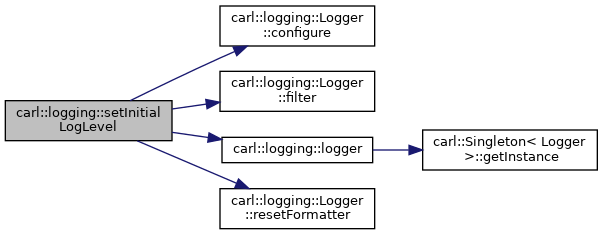Contains a custom logging facility. More...
Data Structures | |
| class | Filter |
| This class checks if some log message shall be forwarded to some sink. More... | |
| class | Formatter |
| Formats a log messages. More... | |
| class | Logger |
| Main logger class. More... | |
| struct | RecordInfo |
| Additional information about a log message. More... | |
| class | Sink |
| Base class for a logging sink. More... | |
| class | StreamSink |
Logging sink that wraps an arbitrary std::ostream. More... | |
| class | FileSink |
| Logging sink for file output. More... | |
Enumerations | |
| enum class | LogLevel { LVL_ALL , LVL_TRACE , LVL_DEBUG , LVL_INFO , LVL_WARN , LVL_ERROR , LVL_FATAL , LVL_OFF , LVL_DEFAULT = LVL_WARN } |
| Indicated which log messages should be forwarded to some sink. More... | |
Functions | |
| void | setInitialLogLevel () |
| void | configureLogging () |
| Logger & | logger () |
| Returns the single global instance of a Logger. More... | |
| bool | visible (LogLevel level, const std::string &channel) noexcept |
| void | log (LogLevel level, const std::string &channel, const std::stringstream &ss, const RecordInfo &info) |
| std::ostream & | operator<< (std::ostream &os, LogLevel level) |
| Streaming operator for LogLevel. More... | |
Detailed Description
Contains a custom logging facility.
This logging facility is fairly generic and is used as a simple and header-only alternative to more advanced solutions like log4cplus or boost::log.
The basic components are Sinks, Channels, Filters, RecordInfos, Formatters and the central Logger component.
A Sink represents a logging output like a terminal or a log file. This implementation provides a FileSink and a StreamSink, but the basic Sink class can be extended as necessary.
A Channel is a string that identifies the context of the log message, usually something like the class name where the log message is emitted. Channels are organized hierarchically where the levels are separated by dots. For example, carl is considered the parent of carl.core.
A Filter is associated with a Sink and makes sure that only a subset of all log messages is forwarded to the Sink. Filter rules are pairs of a Channel and a minimum LogLevel, meaning that messages of this Channel and at least the given LogLevel are forwarded. If a Filter does not contain any rule for some Channel, the parent Channel is considered. Each Filter contains a rule for the empty Channel, initialized with LVL_DEFAULT.
A RecordInfo stores auxiliary information of a log message like the filename, line number and function name where the log message was emitted.
A Formatter is associated with a Sink and produces the actual string that is sent to the Sink. Usually, it adds auxiliary information like the current time, LogLevel, Channel and information from a RecordInfo to the string logged by the user. The Formatter implements a reasonable default behaviour for log files, but it can be subclassed and modified as necessary.
The Logger class finally plugs all these components together. It allows to configure multiple Sink objects which are identified by strings called id and offers a central log() method.
Initial configuration may look like this:
Macro facilitate the usage:
-
CARLLOG_<LVL>(channel, msg)produces a normal log message where channel should be string identifying the channel and msg is the message to be logged. -
CARLLOG_FUNC(channel, args)produces a log message tailored for function calls. args should represent the function arguments. -
CARLLOG_ASSERT(channel, condition, msg)checks the condition and if it fails callsCARLLOG_FATAL(channel, msg)and asserts the condition.
Any message (msg or args) can be an arbitrary expression that one would stream to an std::ostream like stream << (msg);. No final newline is needed.
Enumeration Type Documentation
◆ LogLevel
|
strong |
Indicated which log messages should be forwarded to some sink.
All messages which have a level that is equal or greater than the specified value will be forwarded.
Definition at line 12 of file LogLevel.h.
Function Documentation
◆ configureLogging()
|
inline |
Definition at line 61 of file carl-logging.h.


◆ log()
| void carl::logging::log | ( | LogLevel | level, |
| const std::string & | channel, | ||
| const std::stringstream & | ss, | ||
| const RecordInfo & | info | ||
| ) |
◆ logger()
|
inline |
Returns the single global instance of a Logger.
Calls Logger::getInstance().
- Returns
- Logger object.
Definition at line 194 of file Logger.h.


◆ operator<<()
|
inline |
Streaming operator for LogLevel.
- Parameters
-
os Output stream. level LogLevel.
- Returns
- os.
Definition at line 39 of file LogLevel.h.
◆ setInitialLogLevel()
| void carl::logging::setInitialLogLevel | ( | ) |
Definition at line 8 of file carl-logging.cpp.


◆ visible()
|
noexcept |

